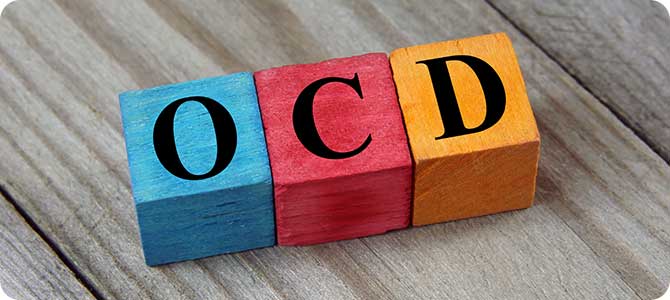Obsessive Compulsive Disorder (OCD) Treatment Q&A
Obsessive-compulsive disorder is a mental health disorder characterized by recurrent, intrusive thoughts (obsessions) and repetitive behaviors (compulsions). People with OCD often experience significant distress and anxiety due to these obsessions and compulsions. Need help with OCD? Talk to a specialist today at Psychiatry of the Palm Beaches! For more information, contact us today or book an appointment online. We have convenient locations to serve you in Jacksonville, Boynton Beach, Palm Beach Gardens, Stuart, Royal Palm Beach, Port St. Lucie, Melbourne, Fort Lauderdale, and Jupiter, FL.




Table of Contents:
What is OCD?
What are the main symptoms of OCD?
What causes OCD?
Where can I get help for my OCD?
Obsessive-compulsive disorder (OCD) can affect individuals of any age or background and can have a significant impact on one’s daily life. As such, our psychiatrists at Psychiatry of the Palm Beaches have compassion for any individual dealing with OCD and would be proud to provide highly effective treatment options to you if you are dealing with OCD. To give you a better idea of what OCD is and what treatment entails, we have provided some answers to commonly asked questions about OCD below!
Obsessive-compulsive disorder is a mental illness that occurs when an individual experiences obsessions, which are unwanted and intrusive thoughts, images, sensations, or urges that lead them to repetitive behavior, or compulsions, to eliminate the obsessions or decrease anxiety.
While you may hear some individuals say that they have “a little OCD” or that their “OCD has kicked in,” it is important to differentiate OCD from those minor obsessions or compulsions that occur from time to time with the average person.
Comparatively, OCD is a chronic and constant condition that often gets worse the more a person tries to ignore or stop the obsessions. Furthermore, the compulsions a person with OCD experiences are not always logically linked to the obsessions but can often function as a type of ritual.
As mentioned, the primary symptoms of OCD are obsessions and compulsions. However, these obsessions and compulsions can take different forms for any individual with OCD. With that in mind, some common signs of obsessions and compulsions with OCD include:
• Aversion to uncertainty and doubts, causing behavior such as repeatedly checking to see if the door is locked or stove is turned off
• Avoiding certain situations that trigger obsessions, like shaking hands, being in large groups, or touching particular objects
• Extreme stress when objects are not facing the correct way
• Fear of contamination by people or the environment
• Intrusive thoughts or images, which are often unpleasant, violent, sexual, or inappropriate
• Need repeated reassurance about certain things
• Silently repeating certain words, phrases, or prayers
• Washing your hands until they are red and raw
Some common themes of obsessions and compulsions with OCD include:
• Fear of contamination
• Fear of losing control
• Fear of harm
• Need for evenness, exactness, or certainty
• Unwanted sexual thoughts
Since OCD can take many different forms, the above signs and symptoms are not meant to be exhaustive but rather illustrative of the types of obsessions and compulsions that someone with OCD can experience.
While the cause of OCD is unclear, there are some theories about its cause, as well as known risk factors that can increase one’s likelihood of developing OCD. With that in mind, researchers believe that some combination of biology, genetics, and learned behavior causes OCD, at least in part. In terms of risk factors, such things as stressful or traumatic life experiences, other mental illnesses, and a family history of OCD increase one’s risk of developing OCD.
If you are dealing with OCD, a well-respected psychiatric clinic in your area can provide excellent care and treatment. If you live in or near Boynton Beach, Florida, we would love to help you find effective ways of managing and overcoming your OCD at Psychiatry of the Palm Beaches! For more information, call us today or book an appointment online.
Understanding OCD With Our team
At Psychiatry of the Palm Beaches, our team helps patients understand Obsessive Compulsive Disorder (OCD) and how intrusive thoughts and repetitive behaviors interfere with daily life. Our clear, compassionate approach makes it easier to recognize the signs and seek the right care.
If you would like to learn more about our OCD treatment services at Psychiatry of the Palm Beaches or want to make an appointment with one of our psychiatrists, contact us now. We have convenient locations to serve you. We serve patients from Boynton Beach FL, Delray Beach FL, Palm Beach Gardens FL, Jupiter FL, Stuart FL, Palm City FL, Royal Palm Beach FL, Wellington FL, Citrus Ridge FL, Jacksonville FL, Riverside FL, Port St. Lucie FL, Beau Rivage West FL, Melbourne FL, Palm Bay FL, Fort Lauderdale FL, Hollywood FL, Jupiter FL, North Palm Beach FL, and surrounding areas.
Check Out Our 5 Star Reviews



Additional Services You May Need
▸ Mental Wellness
▸ Relationship Coaching
▸ Depression and Mood Disorders
▸ Women’s Health
▸ Panic Disorder
▸ Medications Management
▸ Men’s Health
▸ Individual Psychotherapy
▸ Bipolar
▸ ADHD
▸ Geriatric Mental Health
▸ Couple’s Counseling
▸ Obsessive Compulsive Disorder
▸ Social Phobia Treatment
▸ Eating Disorders
▸ Post Traumatic Stress Disorder
▸ Psychotic Disorders


